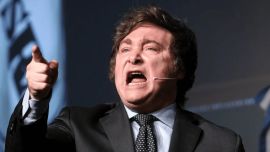Inflation soared beyond expectations in Argentina last month after an abrupt currency devaluation, deepening the nation’s economic crisis before a presidential election in October.
Consumer prices rose 12.4 percent in August from July, the highest monthly increase since 1991 when the country was exiting hyperinflation, according to government data published Wednesday. Economists surveyed by Bloomberg had expected 11.5 percent. On a yearly basis, prices rose 124.4 percent, which is also a three-decade high.
August inflation, double the pace seen in July, confirms the fall-out from the government’s 18 percent currency devaluation the day after a stunning primary election that saw outsider candidate Javier Milei beat Argentina’s two most powerful political forces. Businesses in Buenos Aires and beyond hiked prices overnight after the currency plunge, fueling concerns about a return to hyperinflation.
Despite the inflationary jump last, the Central Bank will likely keep its key interest rate unchanged because it expects price gains to slow later in the year, two officials with direct knowledge of the matter told Bloomberg News earlier.
Fernando Losada, a managing director at Oppenheimer & Co in New York, attributed the high pass through to expansionary monetary and fiscal policies. He predicts inflation still hasn’t peaked in Argentina.
“Devaluing the currency in the absence of a macro stabilization plan is akin to a dog chasing its tail as prices move in unison with or even faster than the exchange rate,” he said. “In the end, the country has more inflation but the real exchange rate fails to weaken.”
The devaluation was also a condition set by the International Monetary Fund as part of the country’s US$44-billion aid programme after the government effectively ran out of dollars to maintain all of its strict currency controls, which have overvalued the peso for years.
Galloping inflation has fuelled Milei’s ascent, challenging Economy Minister Sergio Massa, who is running as the ruling Peronist coalition’s candidate and placed in third. Massa recently announced a slew of drastic measures to lure more voters, such as eliminating income taxes for all but the top one percent of the population and giving government employees a raise.
Economists expect monthly inflation to stay in or near double-digit territory in September too, as the pass through from the currency devaluation to prices ripples through Argentina. Economic activity activity shrank more than expected in June, a sign the economy is likely to enter recession later this year.
Argentines will cast their ballots in the general election on October 22, which could be followed by a runoff vote between the top two candidates on November 19.
related news
by Manuela Tobias, Bloomberg























Comments